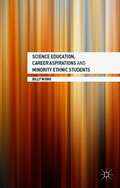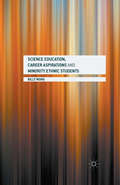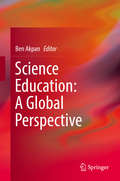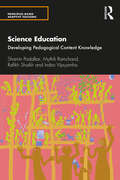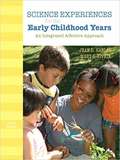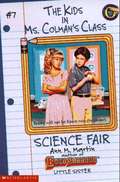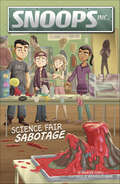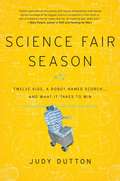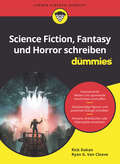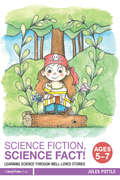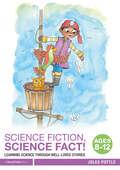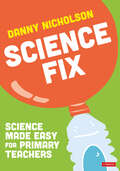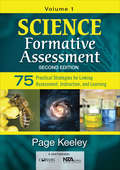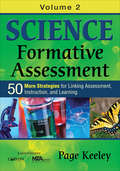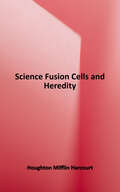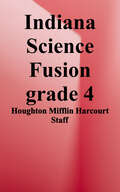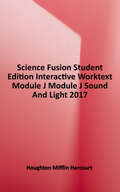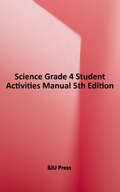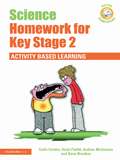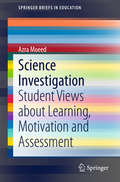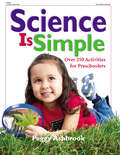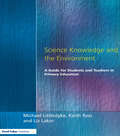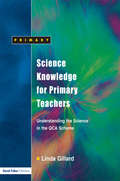- Table View
- List View
Science Education, Career Aspirations and Minority Ethnic Students
by Billy WongIs science typically for White men? Is science for 'people like us'? What are the barriers and opportunities? This book explores the science career aspirations of minority ethnic students. It investigates the views, experiences and identities of British Black Caribbean, Bangladeshi, Chinese, Indian and Pakistani youths in relation to science.
Science Education, Career Aspirations and Minority Ethnic Students
by Billy WongIs science typically for White men? Is science for 'people like us'? What are the barriers and opportunities? This book explores the science career aspirations of minority ethnic students. It investigates the views, experiences and identities of British Black Caribbean, Bangladeshi, Chinese, Indian and Pakistani youths in relation to science.
Science Education: A Global Perspective
by Ben AkpanScience Education: A Global Perspective is 'global' both in content and authorship. Its 17 chapters by an assemblage of seasoned and knowledgeable science educators from many parts of the world seek to bring to the fore current developments in science education and their implications. The book thus covers a wide range of topics in science education from various national and international perspectives. These include the nature of science, science and religion, evolution, curriculum and pedagogy, context-based teaching and learning, science and national development, socially-responsible science education, equitable access for women and girls in science and technology education, and the benefits of science education research. It ends on an optimistic note by looking at science education in 50 years' time with a recommendation, among others, for stakeholders to take the responsibility of preparing children towards a blossoming science education sector in an anticipated future world. This book is suitable for use by discerning researchers, teachers, undergraduate and postgraduate students in science education, and policy makers at all levels of education. Other educationalists and personnel in science and technology vocations will also find it interesting and useful as the reader-motivated approach has guided the presentation of ideas. Science Education: A Global Perspective is a rich compendium of the components of science education in context, practice, and delivery. Dr Bulent Cavas, Professor of Science Education, Dokuz Eylul Univerity, Buca-Izmir, Turkey/President-Elect, International Council of Associations for Science Education (ICASE) This book will be of immense relevance for current and future global strides in training and research in science education. Surinder K. Ghai, Chairman, Sterling Publishers Pvt. Ltd. , New Delhi, India This book provides a refreshing insight into the current status and future direction of science education. It will be very useful to researchers, those pursuing undergraduate and post-graduate courses in science education, and all other personnel involved in the policy and practice of science education. Dr. Bennoit Sossou, Director/Country Representative, UNESCO Regional Office in Abuja, Nigeria
Science Education: Developing Pedagogical Content Knowledge (Principles-based Adaptive Teaching)
by Shamin Padalkar Mythili Ramchand Rafikh Shaikh Indira VijaysimhaThe book presents key perspectives on teaching and learning science in India. It offers adaptive expertise to teachers and educators through a pedagogic content knowledge (PCK) approach. Using cases and episodes from Indian science classrooms to contextualise ideas and practices, the volume discusses the nature of science, and aspects of assessments and evaluations for both process skills and conceptual understanding of the subject. It examines the significance of science education at school level and focuses on meaningful learning and development of scientific and technological aptitude. The chapters deal with topics from physics, chemistry and biology at the middle- and secondary-school levels, and are designed to equip student-teachers with theoretical and practical knowledge abilities about science, science learning and the abilities to teach these topics along with teaching. The book draws extensively from research on science education and teacher education and shifts away from knowledge transmission to the active process of constructivist teaching-learning practices. The authors use illustrative examples to highlight flexible planning for inclusive classrooms. Based on studies on cognitive and developmental psychology, pedagogical content knowledge of science, socio-cultural approaches to learning science, and the history and philosophy of science, the book promotes an understanding of science characterized by empirical criteria, logical arguments and sceptical reviews. With its accessible style, examples, exercises and additional references, it will be useful for students and teachers of science, science educators, BEd and MEd programmes for education, secondary and higher secondary school teachers, curriculum designers and developers of science. It will interest research institutes, non-governmental organisations, professionals and public and private sector bodies involved in science outreach, science education and teaching and learning practices.
Science Experiences for the Early Childhood Years: An Integrated Affective Approach
by Jean Harlan Mary Rivkin<p>A classic in the field, this text takes an integrated approach to science without watering it down, and emphasizes understanding and addressing children's affective nature. It remains a forward-thinking, innovative resource for teaching science to young learners, and a best-selling resource for the field. <p>Clearly organized, the text provides a research-based rationale for early science education in Part I chapters. Emphasizing that meaningful science for young children builds on the emotional underpinnings of their curiosity and concerns about the everyday world, and their pleasure in exploring it, this resource encourages new teachers to help children live appreciatively and thoughtfully on Earth. <p>The topical chapters in Part II offer solid, accessible, concept-based activities and are concurrent with the vision of the new Framework for K-12 Science Education, being developed by the Board on Science Education of the National Academy of Science. For each unit presented, students are provided with all the comprehensive integrating and connecting elements to strengthen children's learning of science. Early educators' own content and pedagogical knowledge will be expanded as they practice using the units in class and in field placements.</p>
Science Fair (The Kids in Ms. Colman's Class #7)
by Ann M. MartinAs part of their science fair project, Bobby Gianelli and his group are studying a mouse named Harriet, but their project is threatened when Harriet suddenly vanishes, until the mouse turns up with her nine new babies.
Science Fair Sabotage (Snoops, Inc.)
by Brandon TerrellIt's time for the Fleischman Middle School Science Fair, and students are excited to show off their projects. But competition is fierce. On the day of the fair, several students discover that their projects have been ruined. Nobody knows who wrecked their experiments, but the Snoops, Inc. team is on the case. Will the kid detectives be able to find out who sabotaged the science fair? Featuring a diverse cast of inner-city youth, this Snoops, Inc. mystery will be sure to keep struggling readers turning the page to find out!
Science Fair Season: Twelve Kids, a Robot Named Scorch . . . and What It Takes to Win
by Judy DuttonThis is the engaging true story of kids competing in the high-stakes, high-drama world of international science fairs. Every year the Intel International Science & Engineering Fair brings together 1,500 high schoolers from more than 50 countries to compete for over $4 million dollars in prizes and scholarships. These amazing kids are doing everything from creating bionic prosthetics to conducting groundbreaking stem cell research, from training drug-sniffing cockroaches to building a nuclear reactor. In Science Fair Season, Judy Dutton follows twelve teens looking for science fair greatness and tells the gripping stories of their road to the big competition. Some will win, some will lose, but all of their lives are changed forever.The Intel International Science & Engineering Fair is the most prominent science fair in the country, and it takes a special blend of drive, heart, and smarts to win there. Dutton goes inside the inner sanctum of science fair competitions and reveals the awe-inspiring projects and the competitors there. Each of the kids--ranging from a young Erin Brokovich who made the FBI watch list for taking on a big corporation, to a quietly driven boy who lives in a run-down trailer on a Navajo reservation, to a wealthy Connecticut girl who dreams of being an actress and finds her calling studying bees, to a troubled teenager in a juvenile detention facility, to the next Bill Gates--take readers on an unforgettable journey. Along the way, Science Fair Season gives readers a glimpse of America's brightest young minds and shows how our country is still a place for inventors and dreamers--the "geeks" our future depends upon.ce & Engineering Fair brings together 1,500 high schoolers from more than 50 countries to compete for over $4 million dollars in prizes and scholarships. These amazing kids are doing everything from creating bionic prosthetics to conducting groundbreaking stem cell research, from training drug-sniffing cockroaches to building a nuclear reactor. In Science Fair Season, Judy Dutton follows twelve teens looking for science fair greatness and tells the gripping stories of their road to the big competition. Some will win, some will lose, but all of their lives are changed forever.The Intel International Science & Engineering Fair is the most prominent science fair in the country, and it takes a special blend of drive, heart, and smarts to win there. Dutton goes inside the inner sanctum of science fair competitions and reveals the awe-inspiring projects and the competitors there. Each of the kids--ranging from a young Erin Brokovich who made the FBI watch list for taking on a big corporation, to a quietly driven boy who lives in a run-down trailer on a Navajo reservation, to a wealthy Connecticut girl who dreams of being an actress and finds her calling studying bees, to a troubled teenager in a juvenile detention facility, to the next Bill Gates--take readers on an unforgettable journey. Along the way, Science Fair Season gives readers a glimpse of America's brightest young minds and shows how our country is still a place for inventors and dreamers--the "geeks" our future depends upon.
Science Fiction, Fantasy und Horror schreiben für Dummies (Für Dummies)
by Rick Dakan Ryan G. Van CleaveSie spielen schon lange mit dem Gedanken, ein Science-Fiction-, Fantasy- oder Horrorwerk zu schreiben, aber Sie wissen nicht, wie Sie es angehen sollen? Oder Sie sind vielleicht schon mitten im Schreibprozess, aber kommen nicht weiter? Dieses Buch liefert Ihnen alle Basics, die Sie brauchen, um faszinierende Welten und packende Charaktere zu erschaffen. Lernen Sie Strategien, um Geschichten aus verschiedenen Genres zu schreiben, zum Beispiel Romane, Kurzgeschichten, Videospiele oder Drehbücher. Anschließend geht es um das spezifische Handwerkszeug für Science-Fiction-, Fantasy- und Horrortexte. Zu guter Letzt geben Ihnen die Autoren auch Tipps, wie Sie Ihr Buch lektorieren, einen Agenten finden oder Ihr Buch per Self-Publishing auf den Markt bringen. So wird aus Ihnen vielleicht bald der nächste Tolkien, King oder Asimov!
Science Fiction, Science Fact! Ages 5-7: Learning Science through Well-Loved Stories
by Jules PottleScience Fiction, Science Fact! Ages 5–7 is a book for story-loving primary teachers who want to find a creative way to teach science. Contextualising science in a story that pupils know and love, the book contains a wide range of activities and investigations to help Key Stage 1 pupils engage in science learning, while also extending aspects of the English national curriculum. The book offers valuable support to busy teachers and, by ensuring science lessons are enjoyable and accessible for pupils, helps children get involved in investigations in a way that is memorable for them. Using coloured illustrations and diagrams throughout, the book contains: the relevant scientific context alongside a link to one of nine exciting children’s stories; clever and unique suggestions to 'storify the science'; instructions for teachers to give to their pupils; tips on how to deliver the lesson in an immersive way; guidance on assessing pupils’ level of understanding. Science Fiction, Science Fact! Ages 5-7 is packed full of ideas for weaving science into cross-curricular lessons, and is an invigorating and essential resource for Key Stage 1 teachers and science co-ordinators seeking to inject some creativity into their science lessons.
Science Fiction, Science Fact! Ages 8-12: Learning Science through Well-Loved Stories
by Jules PottleScience Fiction, Science Fact! Ages 8–12 is a book for story-loving primary teachers who want to find a creative way to teach science. Contextualising science in a story that pupils know and love, the book contains a wide range of activities and investigations to help Key Stage 2 pupils engage in science learning, while also extending aspects of the English national curriculum. The book offers valuable support to busy teachers and, by ensuring science lessons are enjoyable and accessible for pupils, helps children get involved in investigations in a way that is memorable for them. Using coloured illustrations and diagrams throughout, the book contains: the relevant scientific context alongside a link to one of nine exciting children’s stories; clever and unique suggestions to ‘storify the science’; instructions for teachers to give to their pupils; tips on how to deliver the lesson in an immersive way; guidance on assessing pupils’ level of understanding. Science Fiction, Science Fact! Ages 8–12 is packed full of ideas for weaving science into cross-curricular lessons, and is an invigorating and essential resource for Key Stage 2 teachers and science co-ordinators seeking to inject some creativity into their science lessons.
Science Fix: Science made easy for primary teachers
by Danny NicholsonMany primary school teachers find science a difficult subject to teach. Not only do teachers need to develop their own knowledge of a complex subject, they also need to know how to bring this subject to life in the primary classroom. Science Fix is here to help! In this practical book, author Danny Nicholson: *Guides you through all areas of the primary science curriculum. *Outlines the subject knowledge you need for each area, enabling you to teach with confidence. *Includes practical advice for teaching and guidance on how to plan and deliver sequences of engaging science lessons. *Outlines activities for teaching that promote scientific thinking and help children to work as scientists. *Identifies common misconceptions, allowing you to anticipate them in planning. *Asks what working scientifically is and, importantly, what it is not.
Science Fix: Science made easy for primary teachers
by Danny NicholsonMany primary school teachers find science a difficult subject to teach. Not only do teachers need to develop their own knowledge of a complex subject, they also need to know how to bring this subject to life in the primary classroom. Science Fix is here to help! In this practical book, author Danny Nicholson: *Guides you through all areas of the primary science curriculum. *Outlines the subject knowledge you need for each area, enabling you to teach with confidence. *Includes practical advice for teaching and guidance on how to plan and deliver sequences of engaging science lessons. *Outlines activities for teaching that promote scientific thinking and help children to work as scientists. *Identifies common misconceptions, allowing you to anticipate them in planning. *Asks what working scientifically is and, importantly, what it is not.
Science Formative Assessment, Volume 1: 75 Practical Strategies for Linking Assessment, Instruction, and Learning
by Page D. KeeleyFormative assessment informs the design of learning opportunities that take students from their existing ideas of science to the scientific ideas and practices that support conceptual understanding. Science Formative Assessment shows K-12 educators how to weave formative assessment into daily instruction. Discover 75 assessment techniques linked to the Next Generation Science Standards and give classroom practices a boost with: Descriptions of how each technique promotes learning Charts linking core concepts at each grade level to scientific practices Implementation guidance, such as required materials and student grouping Modifications for different learning styles Ideas for adapting techniques to other content areas
Science Formative Assessment, Volume 1: 75 Practical Strategies for Linking Assessment, Instruction, and Learning
by Page D. KeeleyFormative assessment informs the design of learning opportunities that take students from their existing ideas of science to the scientific ideas and practices that support conceptual understanding. Science Formative Assessment shows K-12 educators how to weave formative assessment into daily instruction. Discover 75 assessment techniques linked to the Next Generation Science Standards and give classroom practices a boost with: Descriptions of how each technique promotes learning Charts linking core concepts at each grade level to scientific practices Implementation guidance, such as required materials and student grouping Modifications for different learning styles Ideas for adapting techniques to other content areas
Science Formative Assessment, Volume 2: 50 More Strategies for Linking Assessment, Instruction, and Learning
by Page D. KeeleyDeepen scientific understanding with formative assessment! Only by really knowing what your students are thinking can you design learning opportunities that deepen content mastery and meet their individual needs. In this highly engaging resource, internationally respected expert Page Keeley shares 50 new techniques to pinpoint student understanding before, during, and after instruction. In addition to promoting best practices in the classroom, the techniques shared here support learning and link instruction to the Next Generation Science Standards. These flexible assessments can be used with any science curriculum, along with: Practical strategies for use throughout the instruction cycle Considerations for implementation and suggestions for modification An explanation of how each technique promotes learning
Science Fusion
by Houghton Mifflin HarcourtScienceFusion: Student Edition Interactive Worktext Module A Module A: Cells and Heredity 2017
Science Fusion: Interactive Worktext
by Houghton Mifflin Harcourt StaffAcknowledged authors wrote this book. The text covers the following topics: Unit 1 Scientific Methods, Unit 2 Heat and Electricity, Unit 3 Changes to Earth’s Surface, Unit 4 Adaptations and Survival, Unit 5 Forces and Transportation, and also includes Interactive Glossary and Index.
Science Fusion: Student Edition Interactive Worktext Module J Module J: Sound and Light 2017 (Sciencefusion Ser.)
by Houghton Mifflin HarcourtThis textbook companion effectively teaches all the important light and sound-related concepts.
Science Grade 4 Student Activities Manual,
by Bju PressIn BJU Press Grade 4 Science 5th Edition, students will explore Life Science as they learn about plants, animals, and humans; Physical Science as they study energy, waves, light, and sound; and Earth Science as they cover water, natural hazards, and natural resources, all from a biblical perspective. The Student Activities book provides Investigation, Inquiry, Exploration, and STEM activities to engage students’ interest, reinforce learning, and assess understanding. Full-color pages combine graphic organizers and infographics with questions so students can practice and develop visual analysis and other science skills. Study guides for each chapter give systematic review of key concepts, and “Think About It” sections offer application opportunities.
Science Homework for Key Stage 2: Activity-based Learning (Active Homework)
by Colin Forster Vicki Parfitt Andrea McGowanScience Homework for Key Stage 2 is a unique resource for busy teachers - a selection of ‘pencil-free’, hands-on activities, aligned with the National Curriculum Programmes of Study and with clear links to the topics set out in the QCA scheme of work for KS2 science, that teachers can use as extension activities or give to pupils as homework to do with members of their family or friends. Each of the activities encourages the pupils to learn through discussion and through practical activities utilising everyday resources. Each activity is quick and easy for pupils and teachers to manage, and includes: a learning aim, full, clear instructions and discussion points tasks to foster collaboration and partnership between pupils, parents and teachers photocopiable resources. A refreshing approach for teachers and pupils, these activities will foster enthusiasm for learning and inspire pupils' interest in science.
Science Investigation
by Azra MoeedThis book reports the findings of an interpretive case study of the phenomenon of science investigation (science inquiry) from students' perspective. Data were collected from a class of twenty-four Year 11 students in a middle size, co-educational New Zealand school, through Science Laboratory Environment Inventory, student questionnaires, focus group interviews and classroom observations. The participants provided some insightful comments about their learning of science investigation. Illustrative examples highlight; what students found motivational and what demotivated them, what and how they learnt through carrying out science investigation, and how internal assessment influenced their motivation to learn and learning. The connectedness between the complexities of learning science investigation and how motivation, and assessment influenced these 15 year old students' learning is discussed.
Science Is Simple: Over 250 Activities for Preschoolers
by Peggy AshbrookWhat do seeds need to grow? What can the wind do? What is dirt?Like learning to count or read, understanding the fascinating world of science is an essential skill. This innovative book encourages three-to-six-year olds to predict outcomes, ask questions, and investigate answers. Watch preschoolers develop essential observational and analytical skills as they eagerly jump into the hands-on, interactive process that is science.Science Is Simple contains 250 activities spanning 39 kid-pleasing science concepts. From magnets to bubbles, insects to volcanoes, there are experiments to interest each and every child. Budding scientists will "have a ball" learning about objects in motion or feeling the texture of their own homemade paper. Future astronauts will immerse themselves in making a rocket ship and watching it blast off! Children will be captivated as they learn about science and the role it plays in their everyday lives.Science Is Simple includes: *Individual exploration ideas as well as group activities*An appendix with a list of science websites and other resources*An extensive list of suggested children's literature related to the science concepts*Letters to parents that explain each concept that their child explores*Open-ended questions that encourage self-discovery, creative thinking, and new ways of problem solving*Enough fun experiments to keep the children in your classroom learning all year long
Science Knowledge and the Environment: A Guide for Students and Teachers in Primary Education
by Keith Ross Michael Littledyke Liz LakinFirst Published in 2000. Routledge is an imprint of Taylor & Francis, an informa company.
Science Knowledge for Primary Teachers: Understanding the Science in the QCA Scheme
by Linda GillardSpecifically structured around the QCA schemes of work, this book focuses upon developing the science subject knowledge of the reader up to the standards needed for QTS. It provides: clear explanations of the major science "concepts" a primary teacher needs to teach the National Curriculum effectively illustrations of how this knowledge can be applied in everyday teaching and planning direct links within each chapter to the QCA schemes of work review questions and discussion points to aid understanding and comprehension.
